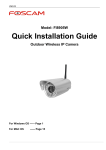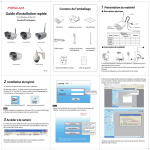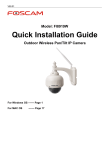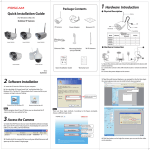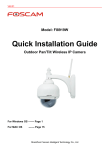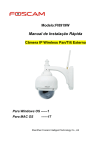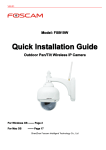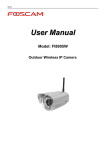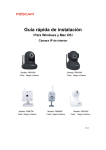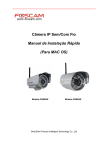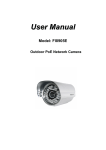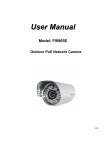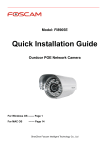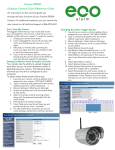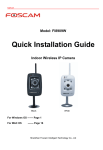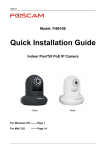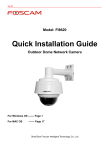Download Quick Installation Guide
Transcript
Quick Installation Guide (For Windows & Mac OS) ) Outdoor Wireless IP Camera V1.1 Package Contents IP Camera Ethernet Cable Power Adapter Resource CD Mounting Bracket(except FI8919) Wi-Fi Antenna Quick Installation Guide Warranty Card 1 Hardware Physical Introduction Description Antenna LAN LENS Infared LED Power Reset Button Hardware Connection Differences 1. PoE(Power over Model Wireless FI8904W FI8905W √ √ × × × × FI8905E × √ × FI8906W √ × × FI8919W √ × √ Ethernet) Pan/Tilt Mount the antenna and make it stand vertically(Only for the device with external antenna). 2. Connect the camera to the LAN network (Router or Switch) via ethernet cable. 3. Connect the power adapter to the camera. 2 Software Installation 1. Insert the CD into the CD drive of your computer. 2. Go to the folder “IP Camera Search Tool” and find the folder “For Windows OS”or “For Mac OS”. Copy and paste the IP camera tool file to your computer, or drag it onto your Desktop. Shortcut icon for Windows OS Shortcut icon for Mac OS Note: If your computer doesn’t have CD drive, you can download the latest IP camera tool from our website for free. 3 Access the Camera 1. Enable the DHCP feature of your router (Enabled by default normally), then open the IP Camera Tool program. It should display the camera’s IP address in your LAN (Local Area Network). 2. Double click the camera list here, and your default browser will open up to the camera’s login page. Default user name is admin with no password. Note: There are three login methods. According to the figure prompted, choose a different login mode. If you use IE browser, select this login mode. If you use Firefox, Google Chrome, Safari, select this login mode. If you use Mobile phone, select this login mode. 3. Take Microsoft Internet Explorer as an example.For the first time login the camera,please make sure to install ActiveX when prompted. Click this button install the ActiveX and Click Run 4. Click Run button, and re-login the camera, you can see the live video on the interface. 4 Security We strongly recommend that you modify your password when you login for the first time. To do this, choose “Device Management” on the bottom of the camera interface, then go to the “Users Settings” section on the left side of the screen. Here you can change the User and Password to prevent intruders from accessing your camera. The default username is admin with no password. Note: 1. If you forget your username or password, you can press and hold the reset button on the bottom of the camera using a pin for 5 seconds. This resets the camera to factory defaults. 2. If you want to access your camera over wireless or the Internet, please continue with the setup by following the Wireless Connection and Remote Access steps below. 5 Wireless Connection Settings 1. Please choose “Device Management > Wireless LAN Settings”, click “Wireless LAN Settings”. 2. Enable “Using Wireless LAN” on the “Wireless LAN Settings” page. 3. Click the Scan button and the camera will detect all WIFI devices around the area. It should also display your router in the list. 4. Click the SSID of your router in the Wireless Network list, the corresponding information (SSID & Encryption) will be filled in the SSID boxes automatically. 5. You will only need to fill in the Share Key. Make sure that SSID, Encryption and Share Key you filled in for the camera are exactly the same for your router. Click the SSID of router and SSID, Encryption will be filled in the following box automatically Enter the same share key with your router. 6. Please click the Submit button after all settings have been entered, the camera will reboot. After the camera has completed the reboot process, wait 10 seconds and disconnect the ethernet cable. 6 Remote Access If you need to access your IP camera outside of your LAN, you need to configure some settings on your router. Please follow the corresponding steps: 1. Run the IP Camera Tool, and assign an IP address for your camera. Right click your camera and click Network Configuration. 2. Enter the name of the User and Password of the Administrator (default user is admin, no password), and click the button ”OK” to apply the modification. The camera will reboot once the modification is done. IP Address: Set this in the same subnet as your computer , or keep it as default. Subnet Mask: Keep it as default. Gateway and DNS Server: Set it to the IP address of your router. Input the Username and password, click OK. 3. Enable UPnP and DDNS in the camera’s settings page. We recommend you to use the Foscam DDNS by factory default, but if you want to use the third party DDNS, please check the user manual for further instructions. 4. Configure port (HTTP port) forwarding on your router. For these steps, we will be using the TP-LINK brand wireless router as an example. First, we need go to the “Forwarding -Virtual Servers” panel for setup. For other brands, you can check the user guide or user manual of the router, or consult the manufacturer. You can see the port of your camera here. If you want to set Remote Access for several cameras on the same network, you will need to change the HTTP port for each camera. Click Add New Input the port and IP address of your camera and click Save. Here you have finished the Port Forwarding setup. 5. Now you can access your IP camera by http://domain name:HTTP port via the Internet. 7 Access the IP Camera by Smart Phone If you want to access your camera on smart phone, please search and install Foscam Viewer on Google Play for Android devices, or search and install Foscam ip cam viewer on APP Store for iOS devices. For details, please refer to the Android or iOS User Manual in the CD. 8 Technical Support If you have problems with your Foscam IP camera, please contact the Foscam reseller you purchased from, or you can e-mail the Foscam headquarter technical support team: [email protected]. Your valuable comments and suggestions on improving Foscam products are welcomed! ShenZhen Foscam Intelligent Technology Co., Ltd www.foscam.com















